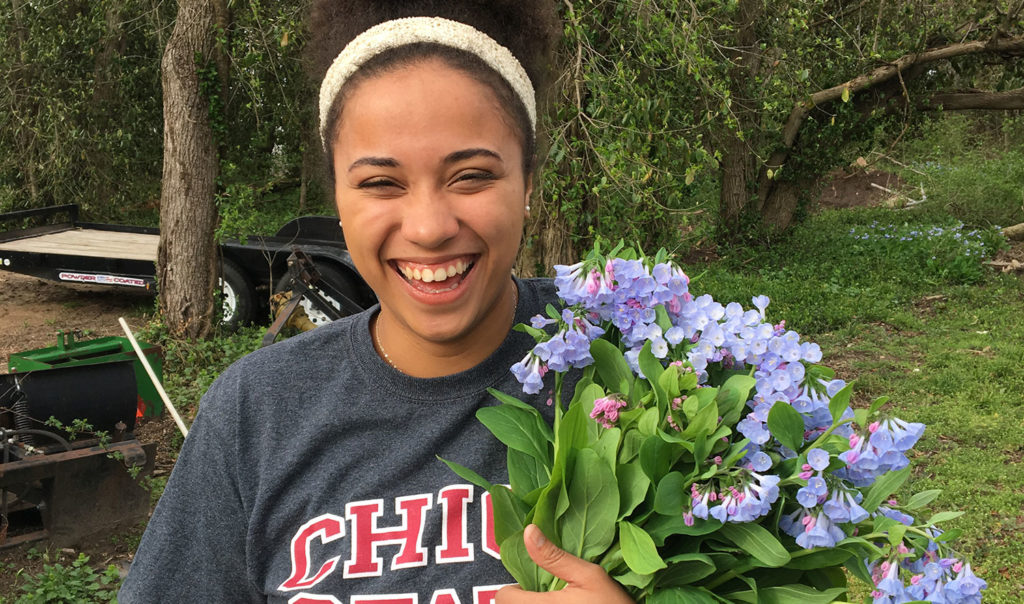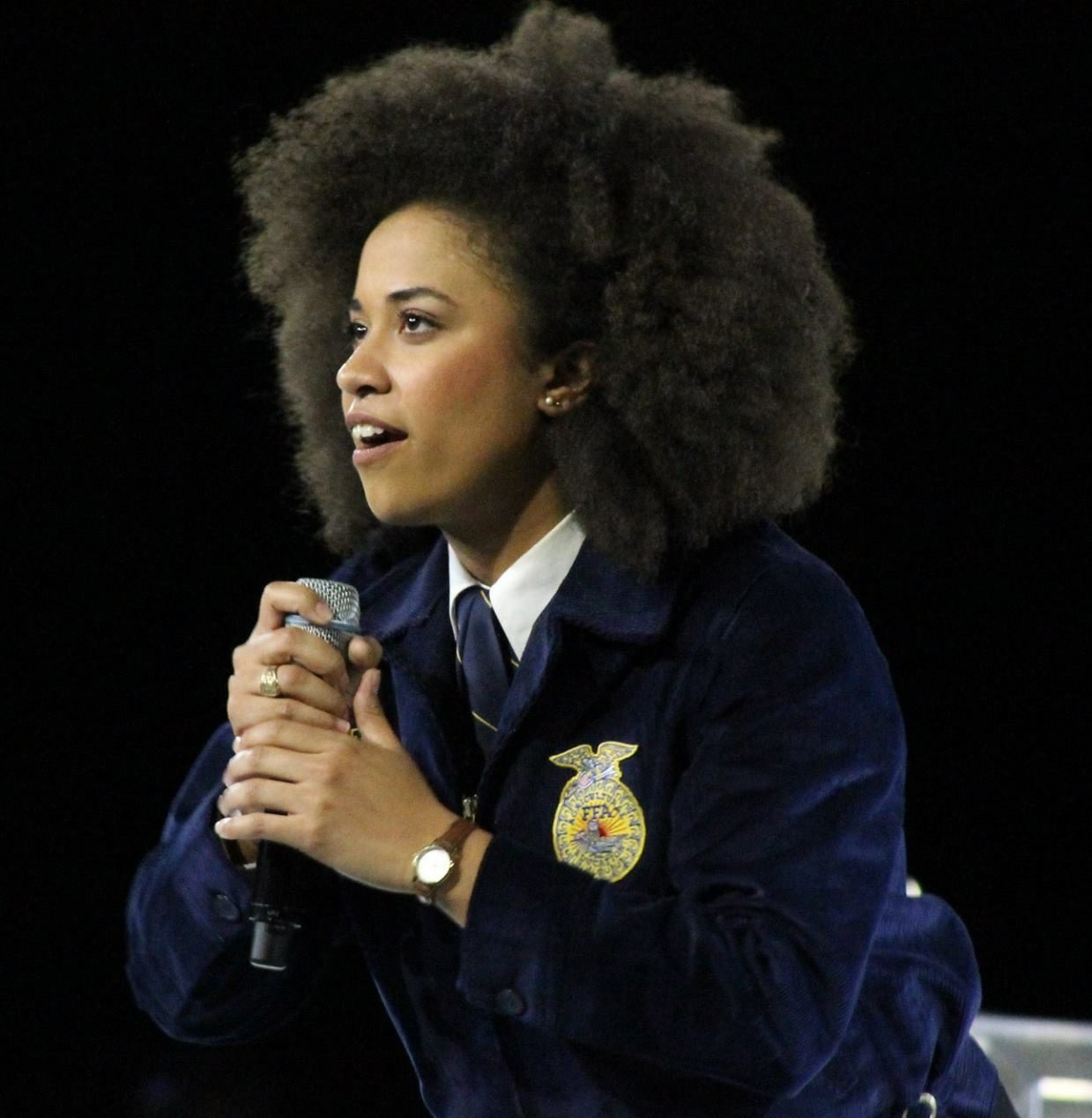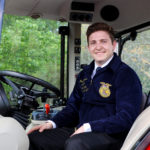If food could speak…
National FFA Organization President Breanna Holbert shares her personal story and her thoughts on modern, urban agriculture and transparency in the food world.

If food could speak…
National FFA Organization President Breanna Holbert shares her personal story and her thoughts on modern, urban agriculture and transparency in the food world.In my life, I wish to spend most days on the farm. Wind chilling the sweat off my brow, soil encased between my nails, an occasional bee whizzing by, and a cool piece of shade to lay on when it just gets too warm to harvest about anything. This farm, is where I want to be. But the farm, in my eyes, can’t even be categorized with the thousands of acres riddled amongst the bustling Californian streets of my Central Valley town. Amongst the grape fields, dairies, and acres of almond orchards, my farm can be found right off Lodi’s busiest main road, cushioned between two residential homes, and beside an ever so ancient palm tree. My farm couldn’t get more urban. In fact, it was my backyard.
I was like any farmer. I had a routine, crops, animals, and a responsibility to care for them. Most days consisted of pulling up my socks, jumping into my shoes, and dashing out to my backyard. There, I would find chicken chores, a few turns of the composter, and some delicately sun dusted tomatoes ready to pick before walking six blocks to school. The result of my labor and tillage could be found in my neighbor’s fridge ready to be cracked and scrambled, in the beds of my school farm providing nutrients to perennials, and in the dishes of my family as we sat down for supper. We were a small operation with the same mission as the rest. Move food forward. Along with AGCO’s mission statement, every farmer looks for new and innovative ways to grow the agricultural industry. Whether through technology such as vertical hydroponics units, bio engineering to fight drought or provide disease tolerance, even mobilizing sustainable ag practices like solar power energy or drip tape irrigation, agriculture’s innovation feeds. However, where innovation thrives in every aspect of the agricultural industry, there are many that question its transparency.
Transparency in the food world has become increasingly important to any and all consumers in America, calling for a need to educate others more than ever about the very industry their food originates from. Urban agriculture has recently found its seat at the table because of its transparency. Today, the average American is three generations removed from the farm. It isn’t, hasn’t, and probably will never make an appearance in most metropolitan, urban, suburban consumer’s lives farther than the grocery store. Even then, consumers are becoming increasingly reliant on labeling and never question the validity in most products packaging. Some are lucky enough to attend farmer’s markets where the producer or farm worker were the very ones to harvest the crop from the soil and to answer any questions about their food or how it was produced. However, many times convenience, price, and hours of market operation may not allow consumers to experience a face to face interaction with these producers.
This is where urban agriculture makes a huge appearance.
Urban agriculture can be defined, as suggested by the RUAF (Resource Centre for Urban Agriculture & Forestry) foundation’s website, as growing of plants and the raising of animals within and around urban systems. The generations removed from the farm don’t need to go anywhere. In this case, the farm will come to them. National FFA Organization (FFA) chapters from across the country have made it their mission to provide that look into the agricultural industry that consumers need through urban agriculture practices. Gatlinburg FFA, along with many urban chapters across the country, had a plant sale where they sold their plants from the greenhouse to locals in their area to beautify their home gardens or even cultivate new gardens. Chapters in Indiana, Iowa, South Carolina, to name a few, have fruit sales that even allow the consumer to walk on the farm, choose which one they purchase, and then take home to their families. FFA has more than 8,500 chapters, which many reside in 24 of the 25 largest cities in America. Our urban population makes up almost 40% of our membership, and our organization is currently exploring new and exciting ways to get urban students more engaged in not only FFA, but in agriculture.
Today, my hope is for all students in every high school to believe in the future of agriculture. Our voices are extremely powerful, and the ability to share the story of agriculture is in need of the younger generation to share its story. In order to accomplish this task, students alongside those from all aspects of the industry must come together to explore innovative ways to share the relevance of agriculture in students’ lives.
One day in Hollywood, California, there will be an urban agriculture school. Students from across the metropolitan area will attend to learn more about agriculture through roof top gardens, areoponics/hydroponics, farmer’s markets, food trucks, and any creative thing under the sun. As their teacher and FFA advisor, I will be there every step of the way to ensure that they are engaged and well-rounded stewards, producers, and consumers of the industry we serve. More importantly, obtain enough knowledge to share the story of agriculture to their communities. But regardless of the program, providing transparency such as this is will provide relevancy to the agricultural industry for all consumers and a responsibility to really know their food.
While sitting underneath the shade of the ancient palm tree on my small urban farm, I thought. I wonder a lot there. Most of the time, I wonder what would happen if food had the ability to speak. If it did, hopefully it wouldn’t need to. That, because its story had already been told. The true story through the eyes of every individual, rural or urban, in America.
Written by: National FFA Organization President Breanna Holbert



